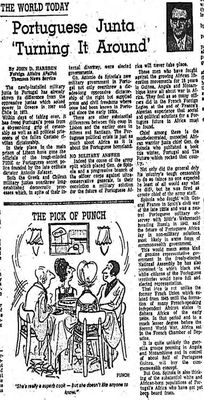
Liberalizations & New Identities
The liberalization of the Portuguese Canadian community marked younger Portuguese Canadians taking more active parts in political movements like demonstrations, public assemblies and electoral campaigns. The retired veterans and increased cultural diversity within Portuguese Canadian communities helped shape the identities of younger generations. Second-generation Portuguese Canadians were able to connect their Portuguese background with their Canadian identity, and began calling for peace and democratization in Portugal to express their sympathy toward the veterans who suffered from wars.
The expansion and development of the Portuguese Canadian communities in Ontario are closely related to the social and political movements back in their European homeland. With the colonial conflict and Portugal's armed conflicts in Africa, Canadian Portuguese communities saw a growing number of veteran families arriving in the 1960s and early 1970s right after the pioneer generation settled in Ontario a decade ago. However, entering the 1970s, Ontarian Portuguese communities saw more liberal values being introduced with younger generations pumping new blood into the communal networks.
The protest you see above is one of the many anti-colonialism demonstrations held by the Portuguese Canadian Democratic Association (PCDA), which was founded in 1959. Through the years of 1960s, thanks to the growing number of war veterans moving to Canada, Portuguese Canadians learned about the cruelty of wars and people's struggle under colonialism. The PCDA members, among the first who took action, began calling for peace and democratization in Portugal. These protests increased public awareness of Portuguese Canadian communities, and helped spread democratic values across the Atlantic.

Liberalization Across the Atlantic
The primary reason this change took place in the early 1970s is the Carnation Revolution of 1974, where Portugal experienced a peaceful political transition that overthrew the Estado Novo regime. The revolution was the result of the long-brewing value of liberalization and social liberty, where the younger generations of Portuguese began affiliating less with their catholic, agrarian identities. Generations of Portuguese born after Estado Novo took over experienced the world in fundamentally different ways than their parents and grandparents did before the second world war; thus, with the constant influence of Anglo-American culture and liberalism, the new generation of Portuguese society began pursuing the nation's democratic reform. These liberalization efforts were also supported by the Portuguese pro-peace movements in both Canada and Europe seeking to decolonize Portugal to stop future bloodshed. Veterans, leftist military, students and intellectuals formed a powerful social force that brought down the conservative dictatorship.

Opportunities, Information, Expression
How did the social liberalization in Portugal affect their Canadian siblings? The Carnation Revolution of 1974 created the pro-western Portuguese Republic that lifted its immigration quota and restrictions. People were able to gain more information via television, newspapers and broadcasts thanks to the freedom of the press. Younger generations were also given chances to study and work abroad, seeking economic opportunities---many decided to migrate and settle in Canada. The existing communal networks in Canada and the newcomers' liberal values enabled Portuguese Canadian communities to take on more active political movements, increasing the public's awareness of Portuguese communities and their culture.
In 1974 General Antonio Spinola, who led the Portuguese army and overthrew the Estado Novo, visited Canada. This visit demonstrated how much influence the Portuguese Canadian communities like PCDA had in Portugal. The young Portuguese Canadians expressed their sympathy for the homeland and called for peace, opening up the gateway to Portugal's liberalization. Antonio Spinola's visit to Canada also spurt hopes among Portuguese Canadians of social liberation in Portugal.

Collective Experiences
Political movements participated by Portuguese Canadians could be seen all around Ontario since the 1960s: with the expanding Portuguese communities, under the growing liberalist values, established their own factory labour societies and worker unions for construction workers and small businesses. While Portuguese Canadians maintained the habit of long commutes and agrarian ideas of self-sufficiency, their Portuguese lives in Canada did not stop them from forming protests and strikes to defend their rights. While workers protested for their rights---a sight rarely seen in the Estado Novo Portugal---veterans and pacifists protested against Estado Novo's war effort and called for the peace and liberation of the Portuguese nation. The seed of liberalization was brought overseas to Ontario, and it fueled the liberalization of Portugal in the 1980s.

Entering the Era of Ice-Breaking
The era of liberalization also marked the end of the era of pioneers: with Portuguese society further opening itself to the world, technological advancement in the 1980s and the rapid rise of popular media led the younger generations of Portuguese to the world of soaring globalization. Although the idea of gatekeeper and soft-landing still provides immense convenience to newcomers, Portuguese Canadians from the 1980s found themselves more comfortable reaching out from their self-sufficient communal network thanks to decades of acculturation and liberalization. The notion of living both as Portuguese and Canadian gradually becomes popular among new settlers, eventually becoming the gateway of communal icebreaking.
Portuguese veterans played irreplaceable roles in the liberalization of Portuguese Canadian communities. Veterans like Pedro Correia, won high respect within their communities through their dedication and experiences in wars. Veterans worked closely with the gatekeepers to help newcomers settle while telling stories of Portuguese migrants to the general public. Pedro Correia's excellent service in Manitoba Portuguese Community demonstrated the importance of veterans because people like him helped form social bonds between Portuguese and Canadian people through sympathy, democracy and diversity.
